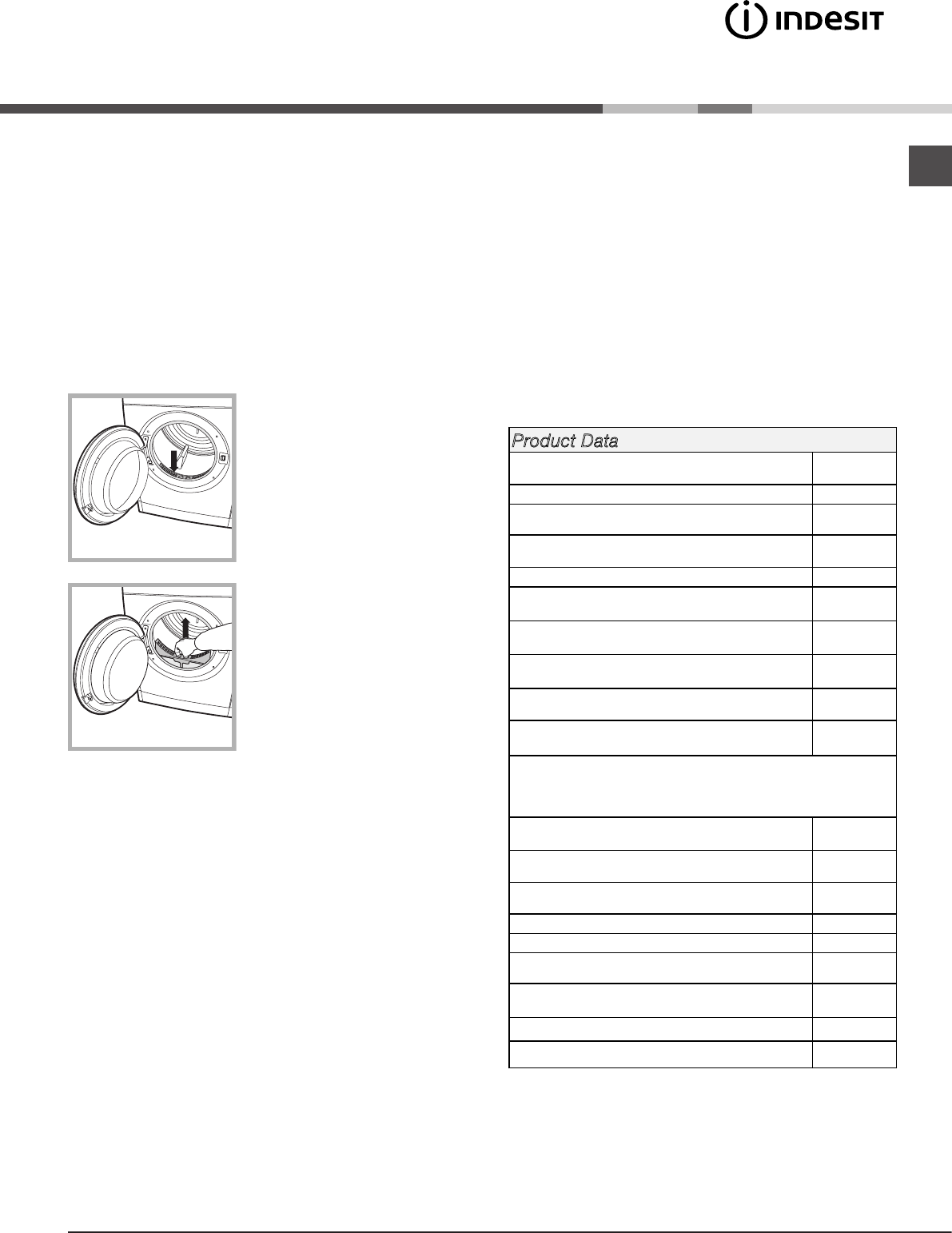
EN
13
Care and maintenance
Disconnecting the power supply
! Disconnect the dryer when not in use or during cleaning
and maintenance operations.
Cleaning the filter after each cycle
The filter is a fundamental component of the dryer: its fun-
ction is to collect lint and fluff that form during drying.
Clean the filter once drying is completed, by rinsing it under
running water or cleaning it with a vacuum cleaner. Should
the filter become clogged, the flow of air inside the dryer will
be seriously hampered: drying times becomes longer and
more energy is consumed. Moreover, the dryer may become
damaged.
The filter is located behind of
the dryer seal (see Picture).
Removing the filter:
1. Pull the filter’s plastic handle
upwards (see Picture).
2. Clean the fluff off the filter
and replace it correctly. Ensure
that the filter is pushed fully
home.
! Do not use the dryer unless the filter has been replaced in
its holder.
Checking the drum after each cycle
Rotate the drum manually to remove smaller items (handker-
chiefs) that could have been left inside the dryer.
Cleaning the drum
! Avoid using abrasives, steel wool or stainless steel cleaning
agents to clean the drum.
A coloured film may appear on the stainless steel drum
surface: it may be caused by a combination of water and/or
cleaning agents such as fabric conditioners. This coloured
film does not affect the dryer’s performance.
Cleaning the tumble dryer
• The external metal and plastic parts and the rubber parts
can be cleaned with the aid of a damp cloth.
• Periodically check the vent hose and all other parts of the
venting system and remove any accumulations of fluff and
lint.
! Do not use solvents or abrasives.
! Have the dryer checked regularly by authorised technical
personnel in order to ensure that the electrical and mechani-
cal parts work safely (see Assistance).
Product Data
Rated capacity of cotton laundry for the "standard cotton
programme" at full load - kg
7.0
Energy efficiency class B
The weighted Annual Energy Consumption (AEc)* kWh 471.7
This household tumble drier is a Automatic
This household tumble drier is a Vented
Energy consumption full load; Edry - kWh 4.04
Energy consumption partial load; Edry½ - kWh 2.12
Power consumption: off-mode (Po) - Watts 0.14
Power consumption: left-on mode (Pl) - Watts 1.91
Duration of the 'left-on mode' for power management
system - minutes
30
Prog. Time - weighted (Tt) full & partial load - minutes 84
Full load (Tdry) - minutes 114
Partial load (Tdry½) - minutes 62
Condensation efficiency class N/A
Average condensation efficiency - %
full load (Cdry) 0
partial load (Cdry½) 0
weighted (Ct) full & partial load 0
Airbone acoustical noise emissions - dB(A) re 1 pW 69
The Standard Cotton Programme** suitable for drying normal wet cotton
landry that it is the most efficient programme in terms of energy
consumption for cotton used at full and partial load.
This is the test cycle in accordance with Regulation 392/2012.
See our website for all product fiche data:
http://www.indesit.com/indesit/.
*Consumption per year is based on 160 drying cycles of the
standard cotton programme at full and partial load, and the
consumption of the low-power modes.
Actual energy con-
sumption per cycle will depend on how the appliance is used.
**The Standard Cotton Programme is Cottons Cupboard Dry


















